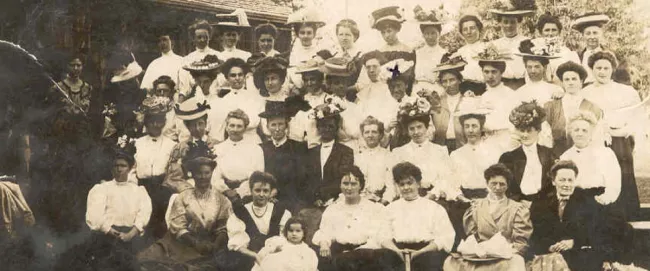From the archives: The Maple Women’s Institute
Learn more about the
city’s history from the Vaughan Archives
From the traditional territories of the First Peoples of Turtle
Island, to a farmland community, to a bustling city centre and everything in
between – Vaughan's transformation is a story worth telling. As part of a
monthly series, the City of Vaughan releases historical content from the Vaughan
Archives, Office of the City Clerk.
Scroll through memory
lane, learn about the city's past and explore the places, people and events
that were pivotal to the development of the Vaughan we know today. This month,
the City is highlighting the history of the Maple Women’s Institute.
The Maple Women’s Institute was one of the earliest community groups
formed in Ontario that followed Adelaide Hunter Hoodless’s mandates with a
focus on domestic reform. It was organized in April 1898 by Miss Maddock. Jennie
Rumble served as the first president and Miss F. Thomas (later Mrs. William
Cook) was the secretary.
The institute’s first meeting was held in an old shed of a hotel in
Maple that was known as Richardson’s. The dances the group organized were also
held in this building.
Many members of neighbouring Women’s Institutes attended the 50th, 60th
and 65th anniversaries of Maple Women’s Institute. At the 50th anniversary
celebration, there were two attendees had been members for all 50 years – Mrs. H.C.
Bailey and Mrs. Joshua Manning.
Detailed minute books with the group’s deliberations, decisions and
activities from 1920 to 1991 are included in the City’s archives. Included in
the two volumes of the Tweedsmuir History’s are photographs from the 19th and
20th century, which depict Maple’s early architecture including the Maple
Community Library, Canadian Bank of Commerce and Maple Community Centre, as
well as events such as the Superior Propane Explosion of 1962 and institutions
and agencies such as Woodbridge and Vaughan Telephone Company and the Maple
Flying Club.
Other local women’s groups in the area that also followed Hoodless’s
mandates included that of Kleinburg and Nashville, Thornhill, Woodbridge,
Burwick, Edgeley, Vellore, Elder’s Mills, the Mark-Vaun, Richmond Hill and
Langstaff Women’s Institutes.
The Maple Women’s Institute formally disbanded in 1991.
ABOUT VAUGHAN ARCHIVES
Established in 1988,
the City of Vaughan
Archives
is home to more than 600 collections, consisting of both City records and cultural
records about Vaughan from 1860 to the present day. Records include, but are
not limited to, the following:
- City business records with long-term legal and administrative value, such as Council meeting minutes, by-laws, assessment rolls, financial records, reports and official correspondence
- church, community and school records
- census records
- historical photographs
- land records
- historical maps, plans and aerial photographs
- newspapers
- personal papers of past residents and founding families, such as diaries, family histories, journals and letters
- records of local organizations both past and present
VIEW VAUGHAN'S ARCHIVES
ONLINE!
As part of the City's
COVID-19 response, Vaughan City Hall remains closed to the public – but the City's
Archival Collection is on digital display for all to explore! The below
galleries are now available in the City's online gallery on Flickr:
- From Township to City: The Evolution of Vaughan
- Featured Artists of Vaughan
- Historical Families of Vaughan
- Historical Figures: Lord Beaverbrook
- Historical Photography
- Recollections of Rural Vaughan
- The Mary Wood Collection
- The Way We Were: Representations of Vaughan's Past
- Vaughan Working Environments
- Vaughan Through the Ages: Medicine
- Vaughan Through the Ages: Music
- Vaughan Through the Ages: Sports and Recreation
- Stories of Remembrance
- Vaughan's Forgotten Heroes
- Early Churches of Vaughan
- Historical Schools of Vaughan
A
personal Flickr account is not required to access the City's online gallery,
which contains only a small selection of the full archives collection. If you
are looking for a particular image, original file, primary source record or
more, please visit the Archives’
Online Catalogue, or contact the Vaughan
Archives by calling 905-832-2281 or emailing archives@vaughan.ca.
By managing and preserving both City and community
records, the Enterprise Information Management Services team ensures that Vaughan's
rich and varied history will continue to be available for future generations. Learn
more at vaughan.ca/archives.

